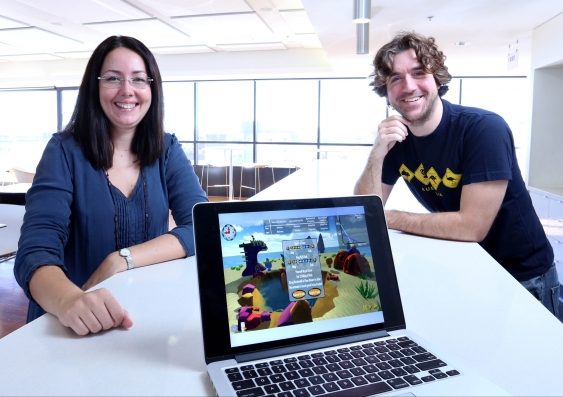UNSW staff honoured in national awards for teaching excellence
The passion and commitment of UNSW teaching staff to create unique and exciting ways to enhance student learning has been recognised in national awards for teaching excellence.
The passion and commitment of UNSW teaching staff to create unique and exciting ways to enhance student learning has been recognised in national awards for teaching excellence.

The passion and commitment of UNSW teaching staff to create unique and exciting ways to enhance student learning has been recognised in national awards for teaching excellence.
Three UNSW lecturers and a UNSW teaching team have received Citations for Outstanding Contributions to Student Learning as part of the Australian Government’s 2016 Australian Awards for University Teaching program.
Announcing the Citations, Minister for Education and Training Simon Birmingham said staff members from the successful universities were assisting in the creation of a world-class higher education system with an international reputation for excellence.
“Creativity and innovation in learning and teaching are the bedrock of a quality higher education system. We are fortunate to have so many dedicated people who consistently go above and beyond to deliver better teaching and student outcomes,” Senator Birmingham said.
Professor Merlin Crossley, UNSW Deputy Vice-Chancellor (Education), congratulated the UNSW award winners on their achievements.
“I am delighted to see the work of our outstanding teaching staff recognised in this way. These awards reflect UNSW’s focus on educational excellence and desire to deliver an exceptional learning experience for all our students,” Professor Crossley said.
Citations are awarded to “those who have made a significant contribution to the quality of student learning in a specific area over a sustained period” and include a $10,000 prize.
Dr Rebecca LeBard has been recognised for “engaging students in the practice of 'being a scientist' and taking a scholarly approach to helping students overcome obstacles in learning scientific inquiry”.
LeBard convenes first-year biology and lectures in biochemistry for the science, medicine and optometry programs at UNSW.
Her work looks at the molecular genetics of microbes, understanding how plasmid DNA is inherited in Archaea, and how molecular markers can be used to trace sources of water pollution.
“I have a continued to be interested in how science is taught and communicated and I am honoured to receive an Australian award for university teaching,” she says.
Dr Leila Morsy has been recognised for “influencing, inspiring and motivating university students to become transformative secondary school teachers through realistic, case based, simulation learning experiences in a caring, university classroom-based environment”.
Morsy is passionate about teaching. At UNSW, she convenes the second-year Bachelor of Education core course and teaches a course on education policy for postgraduates. She began her career as a Teach for America teacher in under-resourced schools in Texas and New York City.
When completing her doctoral studies at the Graduate School of Education at Harvard, she was the teaching assistant for several applied educational policy classes. In 2017 Morsy will also teach a postgraduate course on instructional rounds (similar to medical rounds but for teachers).
Dr Nalini Pather has been recognised for “embedding dialogue and reflection as integral to learning in a blended environment, that promotes inquiry-driven application of concepts to authentic life scenarios”.
Pather is a senior lecturer in the School of Medical Sciences. In the area of medical education, she is particularly interested in student engagement and assessment in the medical sciences and is currently engaged in developing immersive learning technology and gaming for blended learning.
Pather is also investigating the impact of personality and multimodal learning traits on cognitive load and its influence on assessment performance and engagement with blended learning. This research is aimed at developing sustainable and robust assessment methods. She is "honoured to be receiving this award".
LionsHeart Studios, Dr Alberto Motta and Dr Isabella Dobrescu have been recognised for “leadership and innovation that has transformed the teaching of economics, inspiring multidisciplinary first-year students via immersive experiential learning and empowering them to succeed”.
Motta and Dobrescu have transformed their course into an interactive video game to make learning economic fundamentals fun and engaging for students. In the game ‘Playconomics’, students make decisions that have economic and social consequences, all within a simulated world.
“When we gamified 10% of the course, the final exam marks increased roughly by 10% and all types of students benefitted. These results encouraged us to gamify the entire course. The educational impact has been simply outstanding. We have never seen anything like it,” Motta says.
Read more about Playconomics here.
Read the full list of citations for outstanding contributions to student learning here.